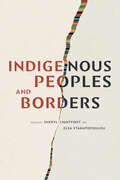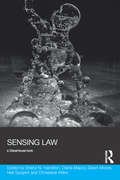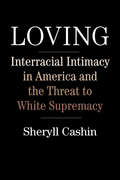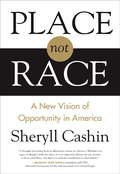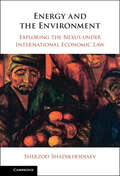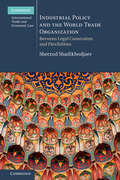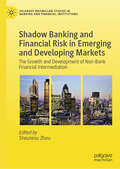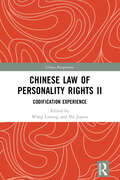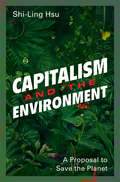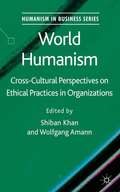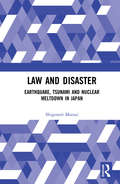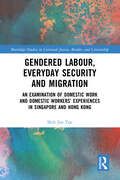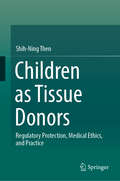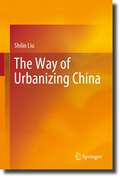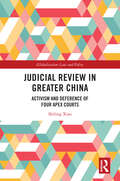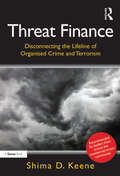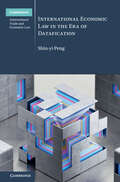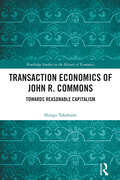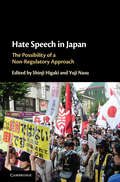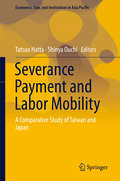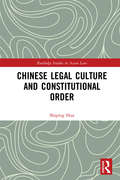- Table View
- List View
Impersonations
by Sheryl HamiltonPersonhood is considered at once a sign of legal-political status and of socio-cultural agency, synonymous with the rational individual, subject, or citizen. Yet, in an era of life-extending technologies, genetic engineering, corporate social responsibility, and smart technology, the definition of the person is neither benign nor uncontested. Boundaries that previously worked to secure our place in the social order are blurring as never before. What does it mean, then, to be a person in the twenty-first century?In Impersonations, Sheryl N. Hamilton uses five different kinds of persons - corporations, women, clones, computers, and celebrities - to discuss the instability of the concept of personhood and to examine some of the ways in which broader social anxieties are expressed in these case studies. She suggests that our investment in personhood is greater now than it has been for years, and that our ongoing struggle to define the term is evident in law and popular culture. Using a cultural studies of law approach, the author examines important issues such as whether the person is a gender-neutral concept based on individual rights, the relationship between personhood and the body, and whether persons can be property.Impersonations is a highly original study that brings together legal, philosophical, and cultural expressions of personhood to enliven current debates about our place in the world.
Indigenous Peoples and Borders
by Sheryl Lightfoot and Elsa StamatopoulouThe legacies of borders are far-reaching for Indigenous Peoples. This collection offers new ways of understanding borders by departing from statist approaches to territoriality. Bringing together the fields of border studies, human rights, international relations, and Indigenous studies, it features a wide range of voices from across academia, public policy, and civil society. The contributors explore the profound and varying impacts of borders on Indigenous Peoples around the world and the ways borders are challenged and worked around. From Bangladesh’s colonially imposed militarized borders to resource extraction in the Russian Arctic and along the Colombia-Ecuador border to the transportation of toxic pesticides from the United States to Mexico, the chapters examine sovereignty, power, and obstructions to Indigenous rights and self-determination as well as globalization and the economic impacts of borders. Indigenous Peoples and Borders proposes future action that is informed by Indigenous Peoples’ voices, needs, and advocacy.Contributors. Tone Bleie, Andrea Carmen, Jacqueline Gillis, Rauna Kuokkanen, Elifuraha Laltaika, Sheryl Lightfoot, David Bruce MacDonald, Toa Elisa Maldonado Ruiz, Binalakshmi “Bina” Nepram, Melissa Z. Patel, Manoel B. do Prado Junior, Hana Shams Ahmed, Elsa Stamatopoulou, Liubov Suliandziga, Rodion Sulyandziga, Yifat Susskind, Erika M. Yamada
Sensing Law (Social Justice)
by Sheryl N. Hamilton, Diana Majury, Dawn Moore, Neil Sargent and Christiane WilkeA rich collection of interdisciplinary essays, this book explores the question: what is to be found at the intersection of the sensorium and law’s empire? Examining the problem of how legal rationalities try to grasp what can only be sensed through the body, these essays problematize the Cartesian framework that has long separated the mind from the body, reason from feeling and the human from the animal. In doing so, they consider how the sensorium can operate, variously, as a tool of power or as a means of countering the exercise of regulatory force. The senses, it is argued, operate as a vector for the implication of subjects in legal webs, but also as a powerful site of resistance to legal definition and determination. From the sensorium of animals to technologically mediated perception, the ways in which the law senses and the ways in which senses are brought before the law invite a questioning of the categories of liberal humanism. And, as this volume demonstrates, this questioning opens up the both interesting and important possibility of imagining other sensual subjectivities.
Loving: Interracial Intimacy in America and the Threat to White Supremacy
by Sheryll CashinHow interracial love and marriage changed history, and may soon alter the landscape of American politics.Loving beyond boundaries is a radical act that is changing America. When Mildred and Richard Loving wed in 1958, they were ripped from their shared bed and taken to court. Their crime: miscegenation, punished by exile from their home state of Virginia. The resulting landmark decision of Loving v. Virginia ended bans on interracial marriage and remains a signature case—the first to use the words “white supremacy” to describe such racism.Drawing from the earliest chapters in US history, legal scholar Sheryll Cashin reveals the enduring legacy of America’s original sin, tracing how we transformed from a country without an entrenched construction of race to a nation where one drop of nonwhite blood merited exclusion from full citizenship. In vivid detail, she illustrates how the idea of whiteness was created by the planter class of yesterday and is reinforced by today’s power-hungry dog-whistlers to divide struggling whites and people of color, ensuring plutocracy and undermining the common good.Cashin argues that over the course of the last four centuries there have been “ardent integrators” and that those people are today contributing to the emergence of a class of “culturally dexterous” Americans. In the fifty years since the Lovings won their case, approval for interracial marriage rose from 4 percent to 87 percent. Cashin speculates that rising rates of interracial intimacy—including cross-racial adoption, romance, and friendship—combined with immigration, demographic, and generational change, will create an ascendant coalition of culturally dexterous whites and people of color.Loving is both a history of white supremacy and a hopeful treatise on the future of race relations in America, challenging the notion that trickle-down progressive politics is our only hope for a more inclusive society. Accessible and sharp, Cashin reanimates the possibility of a future where interracial understanding serves as a catalyst of a social revolution ending not in artificial color blindness but in a culture where acceptance and difference are celebrated.
Place, Not Race
by Sheryll CashinFrom a nationally recognized expert, a fresh and original argument for bettering affirmative action Race-based affirmative action had been declining as a factor in university admissions even before the recent spate of related cases arrived at the Supreme Court. Since Ward Connerly kickstarted a state-by-state political mobilization against affirmative action in the mid-1990s, the percentage of four-year public colleges that consider racial or ethnic status in admissions has fallen from 60 percent to 35 percent. Only 45 percent of private colleges still explicitly consider race, with elite schools more likely to do so, although they too have retreated. For law professor and civil rights activist Sheryll Cashin, this isn't entirely bad news, because as she argues, affirmative action as currently practiced does little to help disadvantaged people. The truly disadvantaged--black and brown children trapped in high-poverty environs--are not getting the quality schooling they need in part because backlash and wedge politics undermine any possibility for common-sense public policies. Using place instead of race in diversity programming, she writes, will better amend the structural disadvantages endured by many children of color, while enhancing the possibility that we might one day move past the racial resentment that affirmative action engenders. In Place, Not Race, Cashin reimagines affirmative action and champions place-based policies, arguing that college applicants who have thrived despite exposure to neighborhood or school poverty are deserving of special consideration. Those blessed to have come of age in poverty-free havens are not. Sixty years since the historic decision, we're undoubtedly far from meeting the promise of Brown v. Board of Education, but Cashin offers a new framework for true inclusion for the millions of children who live separate and unequal lives. Her proposals include making standardized tests optional, replacing merit-based financial aid with need-based financial aid, and recruiting high-achieving students from overlooked places, among other steps that encourage cross-racial alliances and social mobility. A call for action toward the long overdue promise of equality, Place, Not Race persuasively shows how the social costs of racial preferences actually outweigh any of the marginal benefits when effective race-neutral alternatives are available.From the Hardcover edition.
Energy and the Environment: Exploring the Nexus under International Economic Law
by Sherzod ShadikhodjaevEnergy intersects with the environment at all stages of its life cycle by affecting nature and public health and is subject to government measures concerning low-carbon growth, energy efficiency and conservation, renewable energy and ecologically safe supply of nuclear and other energy resources. This timely book provides a comprehensive analysis of the role of international economic law in regulating such an energy-environment nexus under the regimes of the WTO, the Energy Charter Treaty, regional trade agreements and investment treaties. The author discusses the international environmental and economic law foundations of this nexus and extensively examines relevant rules, jurisprudence and practices regarding trade restrictions, subsidies, technical standards, investment protection and technology policies. This book highlights the existing gaps and 'greening' solutions within the framework of international economic law. Where relevant, it draws comparisons between trade law and investment law to show their similarities, differences and (potential) conflicts at the energy-environment interface.
Industrial Policy and the World Trade Organization: Between Legal Constraints and Flexibilities (Cambridge International Trade and Economic Law)
by Sherzod ShadikhodjaevThe severe global financial crisis of 2008 could not be overcome without government interventions through industrial policy. This timely book analyses industrial policy from the perspectives of trade law and economics under the WTO system. The author expertly examines both general tools of protecting and supporting domestic producers and specific topics like special economic zones, localization, greening measures and creative economy. In addition to legal texts and jurisprudence, this book extensively utilizes other WTO materials to show what is actually discussed in WTO meetings and forums on relevant issues. Where applicable, the author advances practical recommendations for 'right' or 'optimal' industrial policy in certain contexts based on trade rules, case law and some countries' real experiences. The author concludes this work with some thoughts on concrete actions to be taken at the WTO and national levels and in academic circles in order to better tackle industrial policy issues.
Shadow Banking and Financial Risk in Emerging and Developing Markets: The Growth and Development of Non-Bank Financial Intermediation (Palgrave Macmillan Studies in Banking and Financial Institutions)
by Sheunesu ZhouThis book discusses non-bank financial intermediation as an alternative or complement to formal banking. With a focus on emerging and developing economies, which face far greater consequences of high risk taking and withdrawal of credit from their financial systems, the book starts with an overview of non-bank financial intermediation, including shadow banking activities, instruments and functions. It covers the main types of activities classified under non-bank financial intermediation and the different players in the non-bank financial system. The interconnectedness between shadow banking and formal banks and their consequential risks will be analysed. Furthermore, the book analyses recent data on shadow banking with a view to estimate the extent of riskiness in shadow banking activities. Analysis of risk spill overs between the formal banking system and shadow banks will be conducted and contribution of shadow banking to systemic risk metrics will also be analysed. This book discusses non-bank financial intermediation as an alternative or complement to formal banking. With a focus on emerging and developing economies, which face far greater consequences of high risk taking and withdrawal of credit from their financial systems, the book starts with an overview of non-bank financial intermediation, including shadow banking activities, instruments and functions. It covers the main types of activities classified under non-bank financial intermediation and the different players in the non-bank financial system. The interconnectedness between shadow banking and formal banks and their consequential risks will be analysed. Furthermore, the book analyses recent data on shadow banking with a view to estimate the extent of riskiness in shadow banking activities. Analysis of risk spillovers between the formal banking system and shadow banks will be conducted and contribution of shadow banking to systemic risk metrics is also presented.
Chinese Law of Personality Rights II: Codification Experience (China Perspectives)
by Wang Liming Shi JiayouThis volume is a collection of articles on the codification experience of China’s Law of Personality Rights, explaining the design of the Law as well as its innovations.As the second volume of a two-volume set that elucidates the theory, practice, and codification of the Law in China, the book explains the legal advancement of the Law of Personality Rights as a standalone part of the Civil Code of China. This includes innovative legislative thinking, law system arrangements, rule designs, and a systematic refinement of the provisions of personality rights in terms of nature, system, types, content, exercising rules and protection methods. Regarding the implementation of the Law, the book points out that personality rights are changing with the times so a more complete system of legal interpretation should be built. The final three chapters are appraisals of different versions of the draft law, with amendments to some articles advanced based on shortcomings and omissions.The book will be an essential reference to scholars and students studying civil law, continental law, Chinese law, and the legal protection of personality rights.
Capitalism and the Environment: A Proposal to Save the Planet
by Shi-Ling HsuRising economic inequality has put capitalism on trial globally. At the same time, existential environmental threats worsen while corporations continue to pollute and distort government policy. These twin crises have converged in calls to revamp government and economic systems and to revisit socialism, given up for dead only 30 years ago. In Capitalism and the Environment, Shi-Ling Hsu argues that such an impulse, if enacted, will ultimately harm the environment. Hsu argues that inequality and environmental calamities are political failures – the result of bad decision-making – and not a symptom of capitalism. Like socialism, capitalism is composed of political choices. This book proposes that we make a different set of choices to better harness the transformative power of capitalism, which will allow us to reverse course and save the environment.
World Humanism
by Wolfgang Amann Shiban KhanThe purpose of World Humanism: Cross-cultural Perspectives on Ethical Practices in Organizations is to discover what is distinctive about humanistic management practices around the world. It examines the nature and occurrence of humanistic management practices within businesses and other organizations across the world.
Nocturne of Remembrance
by Shichiri NakayamaMove over, garden-variety anti-heroes, and make way for a villain-hero, darker than the darkest knight: a lawyer with a faulty conscience graces us with his unsolicited presence.Not only does Mikoshiba have no qualms about taking on guilty-as-hell clients provided they can pay his exorbitant fees, but his own past seems mired in inexpiable sin. Yet the cynical attorney, whose legal acumen, at least, is impeccable, mysteriously seeks to defend a thirtysomething woman with limited means and below-average looks who has murdered her deadbeat husband. A sordid case if there ever was one, it makes veteran prosecutor Misaki wonder what the bastard is really after.What unfolds is one of the best courtroom dramas ever to come out of Japan.
Law and Disaster: Earthquake, Tsunami and Nuclear Meltdown in Japan
by Shigenori MatsuiOn the 11th of March 2011, an earthquake registering 9.0 on the Richter scale (the most powerful to ever strike Japan) hit the Tohoku region in northern Japan. The earthquake produced a devastating tsunami that wiped out coastal cities and towns, leaving 18,561 people dead or registered as missing. Due to the disaster, the capability of the Fukushima Nuclear Power Plant, operated by Tokyo Electric Power Company (TEPCO), was compromised, causing nuclear meltdown. The hydrogen blast destroyed the facilities, resulting in a spread of radioactive materials, and, subsequently, serious nuclear contamination. This combined event – earthquake, tsunami, and nuclear meltdown – became known as the Great East Japan Earthquake Disaster. This book examines the response of the Japanese government to the disaster, and its attempts to answer the legal questions posed by the combination of earthquake, tsunami, and nuclear meltdown. Japanese law, policy, and infrastructure were insufficiently prepared for these disasters, and the country’s weaknesses were brutally exposed. This book analyses these failings, and discusses what Japan, and other countries, can learn from these events.
Gendered Labour, Everyday Security and Migration: An Examination of Domestic Work and Domestic Workers’ Experiences in Singapore and Hong Kong (Routledge Studies in Criminal Justice, Borders and Citizenship)
by Shih Joo TanDrawing on original empirical research from Singapore and Hong Kong, Gendered Labour, Everyday Security and Migration interrogates women migrant domestic workers’ experiences of work and workplace exploitation. It examines the ways in which these women negotiate everyday security and safe work against the backdrop of affective employment relations and institutional structures of labour and migration law. It challenges the current emphasis on the language of exploitation and legal approaches to identifying, understanding and rectifying poor employment conditions for women migrant domestic workers. This book addresses the limited research literature that examines the extent to which regulatory or criminal justice responses are relevant to, and utilised by, women migrant domestic workers in their everyday negotiation of safe work and offers a unique contribution to the field. An accessible and compelling read, it will be of interest to researchers from across the fields of criminology, sociology, labour migration studies and women’s studies.
Children as Tissue Donors: Regulatory Protection, Medical Ethics, And Practice
by Shih-Ning ThenThis book examines the position of children who provide tissue to potentially save the life of another. It questions whether child donors of all ages have been treated appropriately and whether they are sufficiently protected in acting as tissue donors, and ultimately considers whether a new regulatory response is needed to benefit donor children.The book couples a legal exposition of the donor child’s position with the medico-ethical reality of clinical practice. In recent years, a growing body of literature concerning the clinical experiences and outcomes for child donors has emerged. This book adds to this by examining another dimension – the regulatory frameworks at play. It examines the ethical arguments for and against children acting as tissue donors and provides an original analysis of the legal and non-legal regulatory frameworks governing children’s participation in the United Kingdom, United States and Australia. It combines these doctrinal and theoretical approaches with insights into clinical practice gained from the results of qualitative research conducted with health professionals.The analysis inevitably explores the more general issues of children’s right to make medical decisions, the role of parents in decision-making, the value of the best interests test and alternative (legal and ethical) standards, rights of participation of children before the courts, and the role of law and other forms of regulation in a clinical context.
The Way of Urbanizing China
by Shilin LiuThe book conducts a comprehensive research study on China’s urbanization. It puts forward three theoretical development models of urban planning in China, i.e., the politics-oriented city, the economy-oriented city and the human-oriented cultural city. It makes objective evaluations of the development models of the politics-oriented city and the economy-oriented city. It suggests that relations between the government and the market should be straightened out to solve the hangovers of the development model of the politics-oriented city, and eco-civilization development and cultural development should be put on the top of the government’s agenda in order to cope with the recurring problems and complications brought about by the development model of the economy-oriented city.
Judicial Review in Greater China: Activism and Deference of Four Apex Courts (Globalization: Law and Policy)
by Shiling XiaoThis book examines the judicial review systems in the four areas of Greater China – China, Taiwan, Hong Kong, and Macau – and uncovers judicial review activities of the apex courts of each region. It provides a comparative assessment of judicial activism and deference. The development of modern judicial review is one of the key elements of the twentieth century’s legal heritage. By enforcing the principles of constitutionalism, the rule of law, and human rights protection, many courts have been vested with unprecedented powers and have played an essential role in supervising the exercise of government power through constitutional and administrative review. This work investigates the most up-to-date aspects of judicial review in Greater China and reflects on the modern theory regarding the judicialization of politics in different political regimes: democratic, authoritarian, and hybrid. The volume collects all substantive judicial review decisions delivered in the past twenty years by the four apex courts: the China’s Supreme People’s Court, the Taiwan Constitutional Court, the Court of Final Appeal of Hong Kong, and the Court of Final Appeal of Macau. This comprehensive dataset includes some 800 judicial review decisions, presenting a comprehensive resource of fundamental baseline data for evaluating judicial review in Greater China. The book will be an invaluable companion for scholars and researchers working in the areas of Comparative Public Law, Comparative Constitutional Law, Constitutional Politics, and Asian Studies.
Threat Finance: Disconnecting the Lifeline of Organised Crime and Terrorism
by Shima D. KeeneCriminal and terrorist organisations are increasingly turning to white collar crime such as fraud, e-crime, bribery, data and identity theft, in addition to more violent activities involving kidnap and ransom, narcotics and arms trafficking, to fund their activities and, in some cases pursue their cause. The choice of victims is global and indiscriminate. The modus operandi is continually mutating and increasing in sophistication; taking advantage of weaknesses in the system whether they be technological, legal or political. Countering these sources of threat finance is a shared challenge for governments, the military, NGOs, financial institutions and other businesses that may be targeted. Shima Keene’s Threat Finance offers new thinking to equip any organisation regardless of sector and geographical location, with the knowledge and tools to deploy effective counter measures to tackle the threat. To that end, she brings together a wide variety of perspectives - cultural, legal, economic and technological - to explain the sources, mechanisms and key intervention methodologies. The current environment continues to favour the criminal and the terrorist. Threat Finance is an essential read for fraud and security practitioners, financial regulators, policy-makers, intelligence officials, judges and barristers, law enforcement officers, and researchers in this field. Dr Keene offers an antidote to the lack of good, applied, research; shortcomings in in-house financial and forensic expertise; misdirected financial compliance schemes; legal and judicial idiosyncrasies; unhelpful organisation structures and poor communication. She argues convincingly for a coherent, aggressive, informed and cross-disciplinary approach to an ever changing and rapidly growing threat.
Judges on Trial: The Independence and Accountability of the English Judiciary
by Shimon Shetreet Sophie TurenneThe second edition of Judges on Trial articulates the rules, assumptions and practices which shape the culture of independence of the English judiciary today. Enhanced by interviews with English judges, legal scholars and professionals, it also outlines the factors that shape the modern meaning of judicial independence. The book discusses the contemporary issues of judicial governance, judicial appointments, the standards of conduct on and off the bench, the discipline and liability of judges and the relationship between judges and the media. It is accessible to an international audience of lawyers, political scientists and judges beyond the national realm.
Cleaning and Corporate Management: The Historical and Theoretical Relationship Between Japanese Companies and Their Cleaning Activities
by Shin OhmoriThis book provides a new way of understanding Japanese management by focusing on the relationship between Japanese companies and their social practices. Whereas previous studies have often concentrated on the uniqueness of Japanese companies' systems (e.g., lifetime employment, the seniority system, company-specific unions) or methods (e.g., bottom-up management, Toyota production methods), this book explains the uniqueness of Japanese companies’ activities and practices. It especially highlights the day-to-day cleaning activities that many companies have practiced for numbers of years, regardless of their size or industry. Activities that continue beyond a certain period of time are called social practices, and the book clarifies how this particular social practice has historically been formed in Japanese companies and then shows what it means to keep cherishing those cleaning practices. This study consists of two parts: historical research and theoretical research. The historical research sheds light on the relationship between Japanese companies and cleaning activities from a historical point of view. On the basis of old literature and in-house documents, the reader can understand how Japanese companies have positioned cleaning practices in the process of increasing their growth potential and competitiveness and in maintaining their businesses. The second part explains theoretically the relationship between cleaning and management with quantitative and qualitative data from Japanese companies today. Using survey results from Japanese companies, the book shows what kinds of organizations will be formed and human resources will be developed if companies have been focusing for many years on 5S activities—Sort, Set in Order, Shine, Standardize, and Sustain— that include cleaning. This part of the book presents the distinctive problem-solving and strategy-creation processes of Japanese companies in contrast to the activities of European and American companies.
International Economic Law in the Era of Datafication (Cambridge International Trade and Economic Law)
by Shin-yi PengThis book addresses the challenges of datafication through the lens of international economic law. We are undergoing a wave of datafication practices. If such practices simply continue to evolve without being examined and repaired along the existing path of development, the same issues will continue to accumulate and will more than likely be amplified. The unprecedented economic and social influence of big tech has served as the catalyst for the concept of 'digital sovereignty,' which is rooted in the need to safeguard regulatory autonomy in a datafied world. The current wave of data-driven innovations has placed the policy debates on digital trade and data governance into an even more challenging context. The book – whose chapters are connected by the many facets of 'data' - systematically explains how international economic law can reduce the perils of datafication instead of enhancing them. This title is part of the Flip it Open Programme and may also be available Open Access. Check our website Cambridge Core for details.
Transaction Economics of John R. Commons: Towards Reasonable Capitalism (Routledge Studies in the History of Economics)
by Shingo TakahashiTakahashi reconstructs the key blocks of one of the founders of the institutional school, John R. Commons’ theories of the evolution of capitalism and of institutional change by taking the concept of transaction as a central point of departure.Commons’ theories continue to influence modern economics, and in this book, Takahashi scrutinizes his construction of transaction and its features and offers a reinterpretation of Commons’ institutional economics and transaction economics. He then explores how Commons’ analysis of going concerns (e.g., firms) has broader and deeper applications that extend to monetary policy, labor policy, and the business cycle. Takahashi examines how Commons’ and Veblen’s dynamic theories share cumulative causation. He closes by positing that Commons’ transaction economics seeks “reasonable capitalism” through a virtuous cycle of reasonable value and generation of good business ethics.This book will be attractive to researchers of institutional economics, political economy, heterodox economics, as well as the history of economic thought, law, and ethics.
Hate Speech in Japan: The Possibility of a Non-Regulatory Approach
by Shinji Higaki Yuji NasuThis book explains the past and present status of hate speech regulations in Japan. The United States and European countries have adopted different approaches to resolve their respective hate speech problems. Both of them, however, continue to confront the dilemma that freedom of speech and anti-racism are fundamental values of human rights. Therefore, some scholars criticize the US approach as too protective of freedom of speech, while other scholars criticize the European approach as impermissibly violating that freedom. Compared to these countries, Japan is unique in that it does not criminalize hate speech and hate crime other than in the recently enacted Kawasaki City Ordinance criminalizing some kinds of hate speech. Japan basically relies on a comprehensive set of non-regulative tools to suppress extreme hate speech. This volume analyses Japanese hate speech laws and suggests a unique distinctive model to strike a balance between both core values of democracy.
Severance Payment and Labor Mobility: A Comparative Study of Taiwan and Japan (Economics, Law, and Institutions in Asia Pacific)
by Tatsuo Hatta Shinya OuchiThis book compares legally allowed dismissal conditions in employment contracts in Taiwan and Japan and then examines the possibility of introducing the Taiwan-style severance payment system into Japanese employment contracts. A significant difference exists between employment regulations of Japan and Taiwan. In Japan, dismissal of an employee on the grounds of ability is not easily upheld in a court of law, and a set rule for dismissals with severance payment does not exist. On the other hand, in Taiwan, where regulations do not allow dismissal at will, an employee can still be dismissed with severance payment, as long as due process is followed. Written by labor lawyers and labor economists from both Taiwan and Japan, this book describes the procedures that must be followed in the dismissal process in the two countries. It also shows that this difference in dismissal conditions between the two countries explains the low labor mobility in Japan and high labor mobility in Taiwan, and that this difference in labor mobility, in turn, caused the shift of IT production from Japan to Taiwan in the 1990s. The final chapter of the book elucidates the need for introducing the Taiwan-style severance payment before carrying out further deregulation in Japan.
Chinese Legal Culture and Constitutional Order (Routledge Studies in Asian Law)
by Shiping HuaThis book examines China’s striving for a constitutional order in the 20th century from comparative, historical, and theoretical perspectives. Through a comprehensive study of six major constitutional reforms experienced by China in the last century, Shiping Hua explores pragmatism, instrumentalism, statism, and favoritism as the key features of the Chinese legal culture. Demonstrating that these characteristics have roots in China’s ancient past and coincide with modern communist legal theory, it argues that Chinese legal culture has greatly impacted upon the country’s move to modernize its legal system. By analyzing key constitutional periods in China’s history, this book also evaluates patterns that can be used to better comprehend not only China’s present legal reform but its future legal developments too. As the first book to examine how the Chinese legal culture has affected constitutional reform in the 20th century, Chinese Legal Culture and Constitutional Order will be useful to students and scholars of Asian and constitutional law, as well as Chinese Studies more generally.

